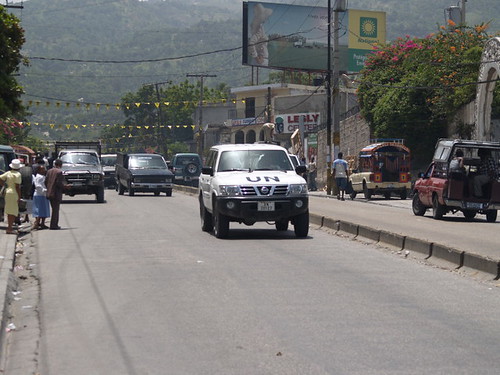PORT AU PRINCE, Haiti — I get conflicting answers as I talk to Haitians about their views of the U.N. MINUSTAH peacekeeping force and the legacy of former President Jean-Bertrand Aristide.
Many Haitians I speak with express their disgust at MINUSTAH inaction in the face of a wave of kidnappings by former Aristide supporters that swept the country after Aristide’s departure in 2004. One computer technician described a situation where dozens of kidnappings occurred each day, many perpetrated by Cité Soleil-based gangs. If a kidnap victim couldn’t raise ransom, more often than not they were shot. Another Haitian I spoke with described hearing about instances where MINUSTAH forces stood by and did nothing to stop these criminal actions. This inaction and the supposed peacekeeper propensity to vacation while Port au Prince burned earned the force the derisive nickname TOURISTA. Rumors also circulated that U.N peacekeepers had stolen goats to eat, causing some Haitians to subsequently greet peacekeepers with bahs when passing them on the street. These are all anecdotal stories and I look forward to asking MINUSTAH members for their side of the story.
Despite a sense that the $550 million spent by the U.N. each year was being spent on vacation pay for multinational soldiers, Haitians seem genuinely thankful for the peacekeeping force’s actions since René Preval took office. Those I have spoken with say that once MINUSTAH finally cracked down on the gang leaders in Cité Soleil, the rash of kidnappings dried up, and that today, a sense of security has returned. The neighborhood vigilante groups formed to protect against kidnapping have melted away, and nightly gunfire is a distant memory. I will be arranging a day trip to Cité Soleil to interview residents there about their experience since MINUSTAH arrived. I imagine it will be a much different perspective.
Finally, I ask each Haitian I meet about Aristide. So far, most seem to think that when he first came to power, he was a good man and leader, and that he truly represented the wishes of the common people, not just the boujwazi class that owns most of the land and large businesses in Haiti. But even an Aristide supporter I spoke with acknowledged that he eventually changed. Their view is that afraid of being forced from power, he became corrupt, using his position to grant attractive posts to political supporters, and eventually turning to gangs in Cité Soleil to help him retain power. Again, these are anecdotal stories and I look forward to further reaction from Aristide supporters.

A U.N. vehicle on the streets of Port au Prince (Aaron Ernst)
